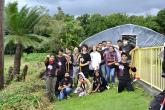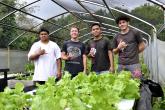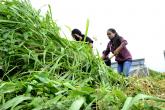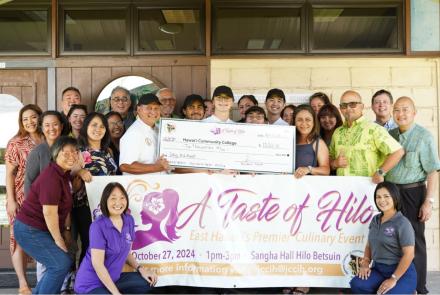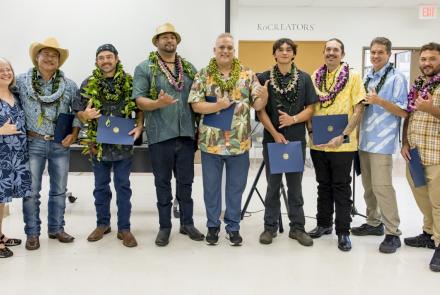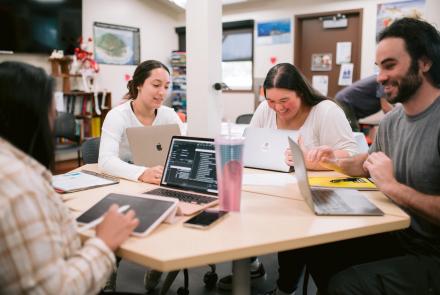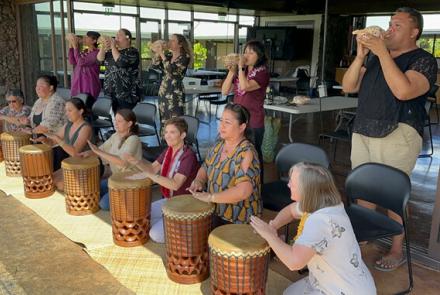Ka’u High Students Earn Dual-Credit Agriculture Certificates
At Ka‘ū High & Pahala Elementary School (KHPES) they are teaching students to dream big, and on May 13, 2022 some of those dreams were realized as 18 students earned certificates in Agriculture from Hawai‘i Community College.
“I think it’s a pretty cool thing to be in high school and getting a college certificate,” said Collin Hanshew, a junior who is earning a 24-credit Certificate of Achievement in Agriculture. “I can say I’m the first in my family to do that, so it’s sort of a bragging moment.”
Most of the 18 graduates joined the Hawai‘i Community College commencement ceremony in Hilo for the college’s first in-person graduation at Hawai‘i CC in two years.
KHPES aligned its curriculum with Hawai‘i CC’s Agriculture program, allowing the students to earn “dual credit,” which means their classes can count for high school and college credit.
The collaboration is part of the Ka‘ū Global Learning Lab initiative at KHPES, which itself is part of a broader redesign of the school. The overhaul is intended to create a more rigorous, engaging and purposeful education for students. The redesign includes a major commitment to supporting students’ college and career journeys after high school, and dual credit is one way to achieve that.
ʻĀina Akamu, the program director for the Ka’ū Global Learning Lab, said partnering with Hawai‘i CC made perfect sense.
“We feel that’s the best school, really, for our students,” he said. “It’s tied more directly to workforce development and it’s affordable.”
Dual-credit classes have become widespread in recent years, but the Agriculture program with KHPES is different because it’s focused on a Career and Technical Education (CTE) subject.
Offering more CTE dual-credit classes at Hawai‘i Island high schools is a new direction Hawai‘i CC has been taking, said Hawai‘i CC Chancellor Rachel Solemsaas, in order to support Hawai’i Island high school seniors’ college and career plans.
“On the initial implementation of Early College, we noticed we were not reaching as many non-college-going high school students as we wanted,” said Hawai‘i CC Chancellor Rachel Solemsaas said. “By offering dual-credit Career and Technical Education programs like Agriculture to the high schools, we can reach a different population of students, who can see a college pathway is attainable for them, and provide a boost to their college and career journeys.”
Akamu pointed out that the students earning Hawai‘i CC certificates in Agriculture have a range of academic backgrounds.
“These students represent the gamut of our kids,” he said. “These aren’t just national honor society kids getting this.”
Student Experiences
On April 29 students were hard at work operating weed whackers and hand tools as they cleared a section of land at KHPES they were preparing to plant.
Nearby were the fruits of their labor over the past two years: immaculate heads of lettuce, corn, taro, eggplant and other produce growing in fields and greenhouses.
Since they began planting, students have harvested over 3,600 pounds of produce and donated it to the Nāʻālehu Resilience Hub. They also volunteered at the Pāhala Senior Center Garden. Harvesting and donating the food is among their favorite aspects of studying agriculture.
“I like giving to the community, growing something and giving it away to older people,” said Hanshew. “They love getting stuff from younger people.”
Lacy Ah Yee, one of the certificate earners, said participating has made her feel closer to her Hawaiian Ancestors.
Cody Ah Yee said his favorite experience was learning how to use drones and cameras to monitor agriculture sites.
“We mapped out how the soil and how the plants were doing with a drone, and it showed where you have water and where you have less water,” he said.
The Ka‘ū Global Learning Lab is at the center of the Ka‘ū Dream, a broader community-driven resiliency project that aims to ensure Ka‘ū is a vibrant place to live, work, play and thrive.
Beyond the skills and knowledge specific to agriculture, Akamu said he’s witnessed an even bigger takeaway from the program.
“The fact that they see themselves as successful,” Akamu said. “That’s the biggest change and impact.”

